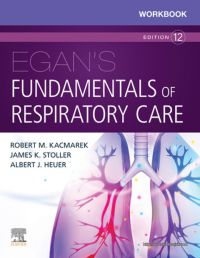Reinforce your understanding of the concepts and skills described in Egan’s Fundamentals of Respiratory Care, 12th Edition! With chapters corresponding to the chapters in Egan’s market-leading textbook, this workbook prepares you to succeed on certification exams with NBRC-style, case study application, and analysis-style questions. This edition includes two new chapters plus a wide range of activities and exercises to guide you through difficult concepts.
New to this edition
- NEW Heart Failure
chapter reinforces the content in this new chapter of the textbook, challenging you to use recall and critical thinking skills.
- NEW Ethics and End-of-Life Care chapter helps you understand this issue and how to help patients and their families.
Key Features
- Word Wizard
helps you remember the terminology used in respiratory care.
- Key points identify the main concepts to remember in each chapter.
- Meet the Objectives lets you assess your understanding of the key content in each chapter.
- Case studies let you apply assessment and intervention strategies, and help you practice critical thinking.
- What Does the NBRC Say? summarizes the expectations of the NBRC (National Board for Respiratory Care) and provides a sampling of NBRC-style, multiple-choice questions to help students prepare for the certification exam.
- Food for Thought provides thought-provoking questions related to respiratory care topics.
- Exercises in each chapter offer hands-on learning with a wide range of activities.
Author Information
By Robert M. Kacmarek, PhD, RRT, FAARC, Professor of Anesthesiology, Harvard Medical School; Director, Respiratory Care, Massachusetts General Hospital, Boston, MA; James K. Stoller, MD, MS, FAARC, FCCP, Jean Wall Bennett Professor of Medicine, Cleveland Clinic,Cleveland Clinic Lerner College of Medicine Chair, Education Institute Cleveland Clinic and Albert J. Heuer, PhD, MBA, RRT, RPFT, FAARC, Program Director and Professor,Masters in Health Care Management Rutgers - School of Health Professions Newark
I: Foundations of Respiratory Care
1. History of Respiratory Care
2. The Profession of Respiratory Care
3. Quality, Patient Safety, and Communication, and Recordkeeping
4. Principles of Infection Prevention and Control
5. Ethical and Legal Implications of Practice
6. Physical Principles of Respiratory Care
7. E-Medicine in Respiratory Care
8. Fundamentals of Respiratory Care Research
II: Applied Anatomy and Physiology
9. The Respiratory System
10. The Cardiovascular System
11. Ventilation
12. Gas Exchange and Transport
13. Solutions, Body Fluids, and Electrolytes
14. Acid-Base Balance
15. Regulation of Breathing
III: Assessment of Respiratory Disorders
16. Bedside Assessment of the Patient
17. Interpreting Clinical and Laboratory Data
18. Interpreting the Electrocardiogram
19. Analysis and Monitoring of Gas Exchange
20. Pulmonary Function Testing
21. Review of Thoracic Imaging
22. Flexible Bronchoscopy and the Respiratory Therapist
23. Nutrition Assessment
IV: Review of Cardiopulmonary Disease
24. Pulmonary Infections
25. Obstructive Lung Disease: Chronic Obstructive Pulmonary Disease (COPD), Asthma, and Related Diseases
26. Interstitial Lung Disease
27. Pleural Diseases
28. Pulmonary Vascular Disease
29. Acute Respiratory Distress Syndrome (ARDS)
30. Respiratory Management of Trauma, Obesity, Near Drowning, and Burns
31. Heart Failure NEW!
32. Lung Cancer
33. Neuromuscular and Other Diseases of the Chest Wall
34. Disorders of Sleep
35. Neonatal and Pediatric Respiratory Disorders
V: Basic Therapeutics
36. Airway Pharmacology
37. Airway Management
38. Emergency Cardiovascular Life Support
39. Humidity and Bland Aerosol Therapy
40. Aerosol Drug Therapy
41. Storage and Delivery of Medical Gases
42. Medical Gas Therapy
43. Lung Expansion Therapy
44. Airway Clearance Therapy (ACT)
VI: Acute and Critical Care
45. Respiratory Failure and the Need for Ventilatory Support
46. Mechanical Ventilators
47. Physiology of Ventilatory Support
48. Patient-Ventilator Interaction
49. Initiating and Adjusting Invasive Ventilatory Support
50. Noninvasive Ventilation
51. Extracorporeal Life Support (ECLS)
52. Monitoring the Patient in the Intensive Care Unit
53. Discontinuing Ventilatory Support
54. Neonatal and Pediatric Respiratory Care
VII: Patient Education and Long-Term Care
55. Patient Education and Health Promotion
56. Cardiopulmonary Rehabilitation
57. Respiratory Care in Alternative Settings
58. Ethics and End-of-Life Care NEW!
Glossary
Index




